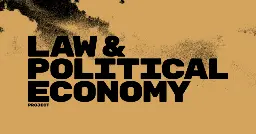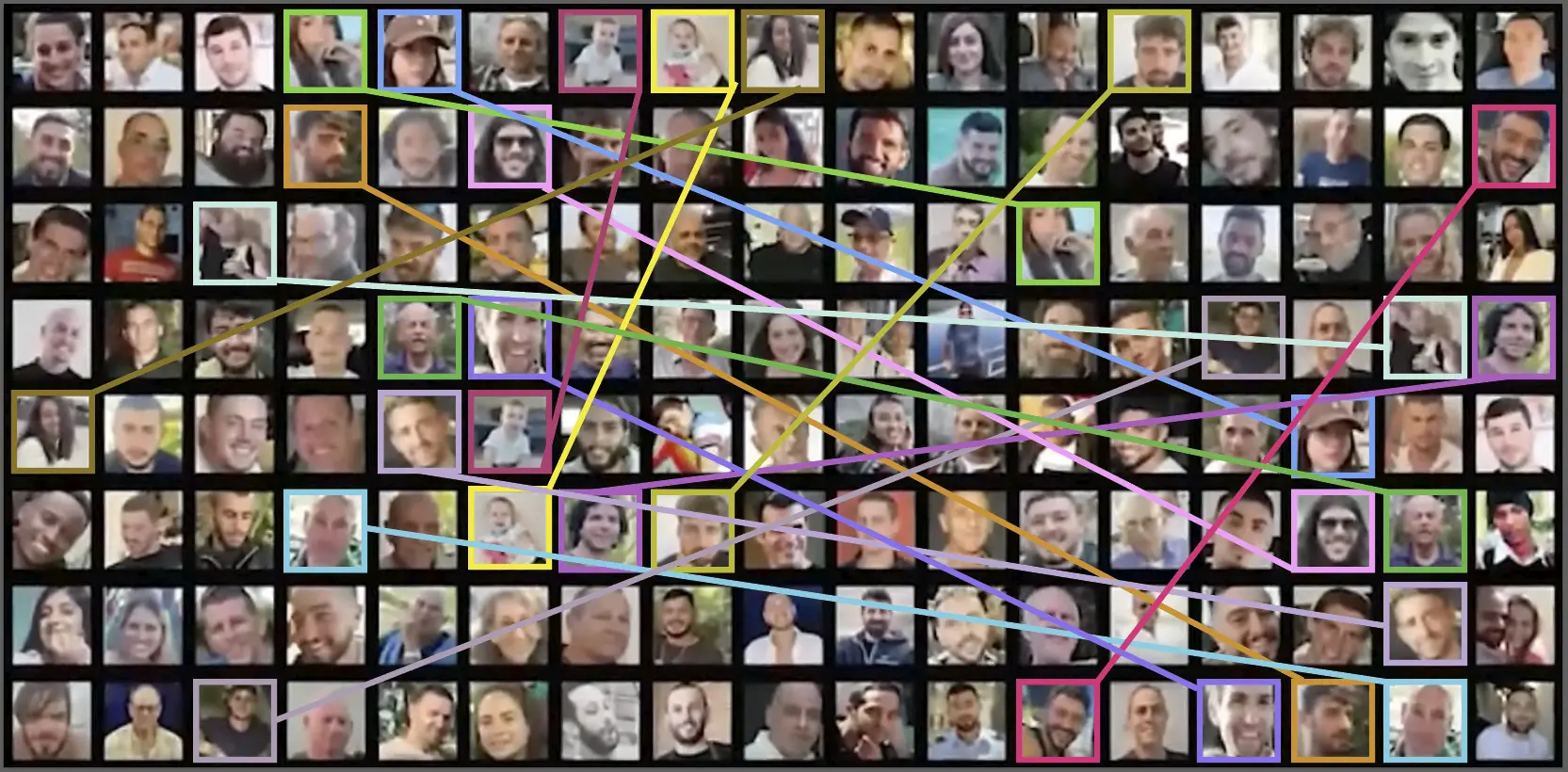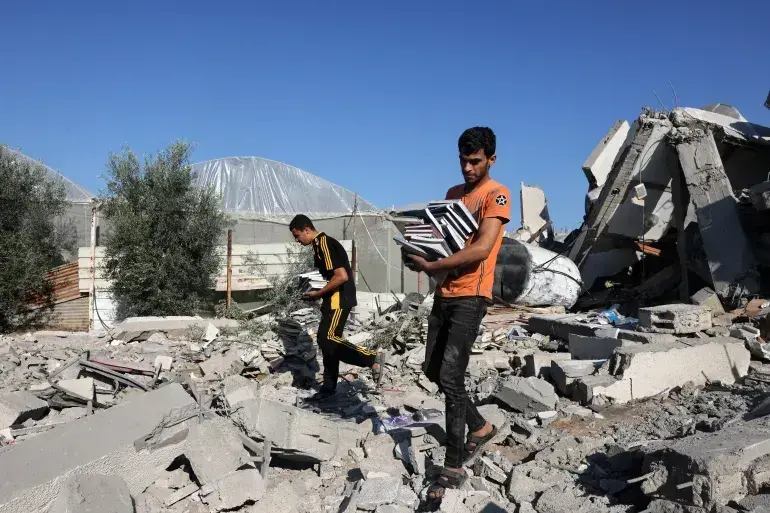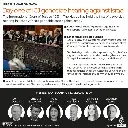Search
Decolonizing Sanctions (Law & Political Economy Project)
Recent calls for the use of boycotts, divestment, and economic sanctions against Israel may seem to stand in tension with another position widely held on the left: the condemnation of economic…

09.30.24
Jeena Shah (@jeenashahesq) is an Associate Professor at the CUNY School of Law
As Ntina Tzouvala has recently argued on this blog, a political-economic understanding of genocide can help explain what is unfolding in Gaza. It shows that the genocide should not be seen as an exceptional or isolated event, but as a violent tool to expedite what decades of settler apartheid couldn’t achieve on its own. It also elucidates why the solidarity efforts of the past two decades, particularly centered around “boycott, divestment, and sanctions” (BDS), transcend mere symbolism. Indeed, as recent student uprisings have stressed, BDS stands as a crucial instrument that, had it been more widely employed by the international community in support of broader Palestinian resistance, could have potentially averted the ongoing genocide.
Such calls for sanctions, however, may seem to stand in tension with another position widely held on the left: the condemnation of the United States’ deployment of economic sanctions as effectively neo-imperial warfare by other means. These justified critiques frequently overlook the important role that sanctions have played, first in support of the anti-apartheid struggle in South Africa, and today in support of Palestinian liberation. This unintentional oversight has, unfortunately, provided fodder for those who accuse current BDS campaigns of unfairly singling out Israel as a target, while ignoring the multitude of other states that commit grave human rights abuses.
However, as I argue in a pair of forthcoming articles, we can resolve this apparent tension by looking closely at how anticolonial resistance movements of the 1960s and 1970s analyzed this dual role of “sanctions” — as both a neoimperial tool and decolonial tool. As they attempted to transform international law from a structure whose raison d’etre was justifying and managing imperialism to one that centered on self-determination – what I call “anticolonial lawmaking” – they developed a robust right of self-determination that offers a legal framework for understanding the role of sanctions in both maintaining and undermining imperialism.
This right of self-determination went beyond merely seeking political independence from direct colonial rule; it also aimed to safeguard that independence from other forms of imperial domination. While independence from direct colonial rule requires divestment and sanctions of distinctly colonial relations, independence from imperial domination forbids the use unilateral economic sanctions against formerly colonized states by former colonizing powers and their settler states. To ascertain the difference between situations demanding the imposition of sanctions and situations prohibiting them, then, anticolonial lawmaking requires an analysis of the political economic operation of colonialism, settler apartheid, and neoimperialism. Sanctions, on this view, should not be seen as a stable, immutable tool, but as protean, operating differently depending on the political economic context.
Sanctions Against Colonial Structures
“Colonialism” is the process by which a state unilaterally annexes a territory to which a people belong without the responsibility to govern or provide for such a people on par with the state’s own citizens. As Prabhat Patnaik and Utsa Patnaik have argued, the political-economic function of colonialism is to achieve a one-way transfer of wealth in the form of land, labor, or money from the colony to the metropole. This is often referred to as the “colonial drain.” Central to this process is the forced or coerced separation of a people from the land to which they belong in order to ensure the metropole’s access to the land and to destroy the colonized people’s ability to sustain themselves, requiring them to resort to working as laborers for the metropole.
In a globally integrated economy, colonizing powers primarily benefit from such extraction through support from the international community via trade, investment, and finance. Anticolonial lawmaking thus understood that the independence from colonial rule necessitated a duty of all states to cease all relations, including economic relations, that help the colonial power benefit from their colonized territory. Rather than serve to punish, retaliate, or deter, such sanctions aim to prevent the colonizing powers from economically benefiting from the land and peoples under its colonial rule, in order to undercut the rationale for such rule to persist.
How does this perspective apply to systems of apartheid? While the conventional understanding of apartheid today typically confines it to a human rights concern of “institutionalized racial discrimination,” anticolonial lawmaking viewed settler apartheid as a structure that arises from the evasion of decolonization and continues as a variant of colonialism—and thus a proper target for decolonizing sanctions.
Settler apartheid states initially gain sovereign power by virtue of an imperial power’s termination of its colonial rule. But not wanting to include a majority indigenous population in its polity on equal terms — and where genocide and removal are no longer politically viable — apartheid is all that remains as the preferred method of settler rule. At first, settler states engage in what is known as petty apartheid: the formally enshrined hierarchy of citizenship in the settler state, maintained by legally-enforced segregation. Under petty apartheid, the settler state effectively creates a colony within its borders, through which harms like racialized wage differentials or the concentration of racialized indigenous peoples in segregated areas are better understood as wealth and land extraction.
However, to avoid criticism of the fundamentally anti-democratic nature of petty apartheid, the settler state gradually moves towards grand apartheid: the creation of bantustans, or semi-sovereign structures within the landmass of the colonized territory. By expelling the indigenous peoples to bantustans, the settler state thereby denationalizes them and can thus deny them equal political power or provisions without running afoul of democratic norms. Since these newly created states cannot exercise the full powers of sovereign statehood, and are instead circumscribed by the settler state’s authority, bantustans are best understood as colonies of the settler state. Petty apartheid and grand apartheid thus function together to maintain distinctly colonial relations. And sanctions that target such relations aim to end the settler apartheid state’s ability to benefit from both its petty and grand apartheid, a step towards the ultimate goal: reunification of the entire landmass as a singular sovereign state with lands restored to the dispossessed indigenous peoples and full equality.
Neo-Imperialism and Sanctions
Gaining freedom from such colonial structures is, while necessary to self-determination, far from sufficient. While the era of decolonization ended the dominance of a particular mode of imperialism, i.e. colonialism, the post-war era also witnessed the United States and Western Europe fully reassemble imperialism by the 1990s without the need for colonialism. They did so by deploying international economic law to impose a singular political economy of capitalism upon all newly decolonized states – a political economy that inherently requires imperialism.
The contemporary reconstruction of European imperialism in the form of neo-imperialism is only legible through an understanding of capitalism’s inherent need for imperialism to ensure its continued operation. As Patnaik and Patnaik explain, without imperialism’s facilitation of ongoing access to cheap land and labor and new markets in what becomes constructed as the periphery, the inherent tendency of the rate of capital accumulation in the metropole to fall would either cause inflation, which would reduce the value of the currency in which capitalists’ wealth is held, or undermine the global monetary system, which would in turn further impede capital accumulation. In other words, imperialism is necessary to prevent capitalism from descending into crisis.
Prior to the widespread political decolonization won by anticolonial resistance movements in the postwar era, imperialism primarily served this function through colonial taxation, an efficient mechanism for direct wealth extraction and to ensure ongoing access to cheap land and labor and new, captive markets. After decolonization, however, the United States and Europe would instead need to take advantage of the economic vulnerability of newly decolonized states to secure such extraction. These states emerged from colonization without reparations and with overwhelming debt inherited from colonial rule. On top of this, they were left with a colonial structuring of production on their landmasses, primarily through large-scale plantation agriculture and extractive industries, that would disadvantage them in global trade relations. Though newly decolonized states tried to reverse these patterns of production to assert economic independence, these colonialism-structured economies were further entrenched through the US-led Green Revolution and the asymmetries imposed by the 1947 General Agreement on Tariffs and Trade (GATT).
These economic vulnerabilities were most dramatically exploited by the United States in manufacturing the Third World Debt Crisis of the 1980s, which caused such rapid capital flight from newly decolonized states that it was, as Joseph Halevi and Yanis Varoufakis describe, “more effective” in breaking the efforts of newly decolonized states to assert economic independence “than any military operation.” Specifically, debt replaced the system of colonial taxation to become the chief mechanism by which the U.S., along with other former colonizing powers, imposed a new form of imperialism.
Like colonial taxation, debt allows lenders to dictate the pattern of production on the debtor’s landmass. In the aftermath of the 1980s Third World Debt Crisis, the IMF and World Bank imposed conditions on loans that required borrowing states to allow for the free entry of foreign capital. And once let in, borrowing states needed to prevent sudden outflows of foreign capital that would throw their economies into acute crisis. As a result, debtor states were compelled to move from responding to the needs of local populations to maintaining “creditworthiness” – meaning imposing policies oriented towards the needs of foreign capital – so as not to upset the confidence of the investors. This system of control was reinforced by trade and investment agreements that former colonized countries entered into in order to participate in the global economy. Together, these mechanisms have compelled formerly colonized states to implement measures that have helped maintain U.S./EU access to cheap land and labor and captive markets.
To sustain this imperialist framework, the compliance of otherwise recalcitrant states is ensured through the use of disciplinary mechanisms, such as warmaking and sanctions. Considered more “efficient” than warmaking, sanctions have been the most effective when designed to exploit the current system of debt-based imperialism in a dollarized global economy. Specifically, U.S./EU sanctions against formerly colonized states have been able to fully exploit the asymmetrical nature of dollarized debt-based imperialism by taking the form of financial and secondary sanctions, resulting in long-lasting catastrophic consequences.
In seeking freedom from such imperial domination, anticolonial lawmaking initially sought to reconstruct the global political-economic order in a way that would impede their subjugation. Attempting to create a “New International Economic Order,” anticolonial lawmaking identified the imperialist metropole-periphery relations embedded in the global political economy as the source of their ongoing underdevelopment and shared a common goal of shedding their peripheral status. The 1980s Third World Debt Crisis defeated this project.
In the face of this loss, newly decolonized states instead emphasized the importance of protections to their *juridical *sovereignty from the disciplinary mechanisms deployed by the capitalist metropoles to enforce the imperialist metropole-periphery relationship. Legal protections that attach to statehood — specifically, sovereign equality and non-intervention — were thus redefined as protections against imperialist encroachment, including specifically economic sanctions imposed by former colonizers and their settler states like the U.S.
Prohibitions on economic sanctions cannot, then, be understood apart from the role that they play in a particular global political economy of a given time. Such an analysis reveals why the right of self-determination prohibits the unilateral deployment of economic sanctions against formerly colonized states, even where those sanctions are purportedly deployed to protect human rights.
\\\*
The foregoing analysis, which I lay out in greater detail in my forthcoming articles, attempts to recover a central insight from the period of anticolonial lawmaking: that the right of self-determination offers a legal framework for understanding the role of sanctions in both maintaining and undermining imperialism. With this in hand, the left need not be reticent in its calls for BDS against Israel and other colonial and settler apartheid powers, while still condemning the imposition of such economic coercion against formerly colonized states.
West Bank residents tell of teargas then shots before US woman’s death
Palestinians say they have no faith in Israel Defense Forces inquiry into killing as US officials insist Gaza ceasefire is near

by Julian Borger and Sufian Taha in Beita and Bethan McKernan in Jerusalem
Sat 7 Sep 2024 14.43 EDT
from #CommonDreams
from #CommonDreams Jewish Organizers Slam #GOP #Antisemitism Hearing as 'Offensive and Dangerous'
"These hearings are designed to stoke divisions so that we forget who is actually unsafe—the students of #Gaza..."
\#DefendStudentProtesters #SolidarityWithPalestine #NotAntisemitism #CeasefireNow #EndUSAidToIsrael #DivestFromIsrael #IsraelWarCrimes \#PalestinianLivesMatter \#StopGazaGenocide \#Gaza #Israel #Palestine #USPolitics \#news #press @palestine @israel
https://www.commondreams.org/news/college-antisemitism-hearing
Mondoweiss is now on #PeerTube, the federated video publishing platform!


Mondoweiss is now on #PeerTube, the federated video publishing platform!
Visit our video server to see all of our materials and follow us there for updated video content.
You can watch, comment on, and share all of our video content right here in the fediverse!
A man set himself on fire at the Israeli embassy in DC. Earlier reports did not include this:
A man set himself on fire at the Israeli embassy in DC. Earlier reports did not include this: “The individual, wearing fatigues, introduces himself as “an active duty member of the U.S. Air Force and I will no longer be complicit in genocide.”” And he continues yelling “Free Palestine.” @palestine
@copticml:
@copticml: the world’s oldest tattoo shop belongs to a coptic family, the razzouks; who have been in jerusalem tattooing pilgrims for more than 500 years. they’ve been doing tattoos since the 14th century — first in egypt, then palestine. they mostly use their own designs & stencils. @palestine @egypt
https://x.com/copticml/status/1760928933095280666?s=12&t=uM8me4uwdP7D0z4nanVVuw
https://nitter.net/copticml/status/1760928933095280666?s=12&t=uM8me4uwdP7D0z4nanVVuw
Israel began bombing Rafah about 4 hours ago and casualties of at least 63 - who knows how many by morning. I just saw ppl shroud a dead baby. (https://a.gup.pe/u/palestine) (http
Israel began bombing Rafah about 4 hours ago and casualties of at least 63 - who knows how many by morning. I just saw ppl shroud a dead baby. @palestine @israel
PRCS: 🚨A 7-year-old gir👧l is besieged by Israeli tanks in (https://sfba.social/tags/Gaza) inside her family's vehicle, which was targeted by the occupation about three hours ago. 📍Everyone insi
PRCS: 🚨A 7-year-old gir👧l is besieged by Israeli tanks in #Gaza inside her family's vehicle, which was targeted by the occupation about three hours ago. 📍Everyone inside it (her father and four siblings) has been martyred. ⭕Our teams continue to communicate with the girl to calm her down, especially since the family was fired upon while contacting emergency services for help. Meanwhile, 🚑ambulances are still unable to reach the location, as the occupation considers it a closed military zone, targeting anyone attempting to move into the area. \#HumanRights #IHL @palestine @israel
https://x.com/palestinercs/status/1751996971479368071?s=12&t=uM8me4uwdP7D0z4nanVVuw
https://nitter.net/palestinercs/status/1751996971479368071?s=12&t=uM8me4uwdP7D0z4nanVVuw
(https://mastodon.social/tags/gaza) (https://mastodon.social/tags/genocide) (https://mastodon.social/tags/childmurder) (https://mastodon


\#gaza #genocide #childmurder #picturesthatdontneedcaptions #israelscrimes #murder #endisraelsgenocide #icj #thehague #usa #uk #canada #germany #austria #czechrepublic #sweden #netherlands #hungary #italy #lithuania #romania #slovakia
Dead bodies of children, just five of more than 13000 little human beings murdered by #netanyahu 's #israel , its' complicit supporters and silent enablers who did not call for a #ceasefire . We must refuse to live in a world where #Humanity got lost.
Majority of Israelis support war on Gaza
Majority of Israelis support war on Gaza
There are massive protests in Tel Aviv drawing over 100,000 people calling for the return of the captives and for this government to strike a deal.
Then, there are the anti-war protests calling for Netanyahu to resign and for new elections soon, in the next few months.
But two-thirds of the Israelis, more than the majority certainly, do support this war.
Stefanie Dekker, AJ
Excuse me, is ANYBODY falling for this shit?


Excuse me, is ANYBODY falling for this shit?
Did Israel really just pull this stunt in the FUCKING ICJ?
I had to try it myself, found another pair.
So, in a total of 136 photos, 16 were duplicates (that's 32 photos). And there may yet still be some I missed (or rather; me and kiddo).
Source: https://www.instagram.com/p/C2A7YPHsHUE/
On youtube: https://youtu.be/imn9daDE2dQ?t=1056
\#ICJ #ICC #UnitedNations #Israel #Gaza #Palestine #GrosseLuge @palestine #Instagram #PropagandaVsTruth
Blinne Ní Ghrálaigh's closing statement in ICJ case against Israel
Blinne Ní Ghrálaigh's closing statement in ICJ case against Israel 1/ “On the basis of the current figures, on average 247 Palestinians are being killed and are at risk of being killed each day, many of them literally blown to pieces. They include 48 mothers each day, two every hour and over 117 children each day, leaving Unicef to call Israel’s actions a war on children."
Hey, (https://hispagatos.space/tags/gringos). The war in (https://hispagatos.space/tags/Ukraine) is a tragedy, and a crime, and thousands of civilians have been killed and war crim
Hey, #gringos. The war in #Ukraine is a tragedy, and a crime, and thousands of civilians have been killed and war crimes committed, by both sides.
But in all its cruelty and destruction, it PALES when compared to 3 months of genocide in #Gaza.
More than twice as many civilians have been killed, in way less time.
There has been a SYSTEMATIC destruction of hospitals and vital infrastructure.
There's clear intent to expel all Palestinians from #Gaza.
1/2
Palestinians collect books from the rubble of a cultural centre following an Israeli strike in Rafah in southern Gaza on November 18, 2023


Palestinians collect books from the rubble of a cultural centre following an Israeli strike in Rafah in southern Gaza on November 18, 2023 [Mohammed Abed/AFP]
@[email protected] @[email protected] @[email protected] @[email protected]
I think you might be using the German, 'kapische' (or maybe Serbian?) in place of the English version, 'capisce' from Italian. Since you are ostensibly spelling German in an English sentence the grammar nazi spelling and wellness check is required.
@8petros Is there a problem with me repping for that pov, whoeverthefuckyouare? I was clear about that, and given your 'fuck..." thingie I figure you for a troll. So get back to me promptly as to whether I'm wrong in regard to the cohort I speak of. Kapische?
Ps. 10 or so self-immolations since the 50s, afaict by a quicksearch on 'poland self immolation', is NOT Socially normal. @Sherifazuhur @palestine @rad
@Sherifazuhur @heretical_i @rad Your perspective is valid for internal US discourse. But not here.
@rad I stand by what I said for the reason stated. This is considered aberrant behavior in US society and AUTOMATICALLY is classified as mental illness. @Sherifazuhur @palestine
@heretical_i @Sherifazuhur @palestine
I disagree. It's an *American soldier* engulfing himself on fire. This is serious and potentially very helpful.
@Sherifazuhur @palestine The media will use him to 'prove' palestine activists are 'dangerous and mentally ill'. His actions were stupid and not helpful to palestinian causes. I suspect he'd already been under psych observation and this could be a 'psych med ramp-up' incident.
@[email protected] @[email protected]
This would make an interesting longform cover article for the tattoo magazines.
@[email protected] @[email protected] @[email protected] @[email protected] @[email protected]
See how quickly everyone forgot about the massive depopulation of Ukraine? It is still ongoing. But focus is now on Gaza while billions continue to get laundered from US to Ukraine.
The enmity between Washington and Kremlin is kabuki theater. The incompetence of the Biden regime is theater. Biden and friends in Washington are fully competent megalomaniacs and grifters playing mind games with the idiocratic electorate.
The regime wants us to think Biden administration is incompetent. They are actors putting on a deliberate show of incompetence. If Joe was so fragile that he was really falling down the stairs they would never let him near stairs without an aid. If he really was senile and mentally incapable with such memory problems he would have been article 25'd a long time ago. Such nincompoop and oopsie moments are planned for the cameras.
The genocide in Gaza was planned already when the Ukraine conflict was planned. They did the same type of joint planning during the two world wars to exterminate tens of millions Germans, Franks, and Poles in the heart of Europe. This was done to establish and strengthen the Soviet Union so Wall Street could invest without consequences. It is also done to kill off the Alpha males in all involved countries who jump to the front of the line to 'fight the enemy'. This weakens and thins the populations of all countries involved to keep the ruling class in control.
Millions of mockingbirds will give play-by-play gossip and opinions on all the fine details that don't matter while ignoring again the words of John Fitzgerald Kennedy:
"For we are opposed around the world by a monolithic and ruthless conspiracy that relies primarily on covert means for expanding its sphere of influence -- on infiltration instead of invasion, on subversion instead of elections, on intimidation instead of free choice, on guerrillas by night instead of armies by day. It is a system which has conscripted vast human and material resources into the building of a tightly knit, highly efficient machine that combines military, diplomatic, intelligence, economic, scientific and political operations. Its preparations are concealed, not published. Its mistakes are buried, not headlined. Its dissenters are silenced, not praised. No expenditure is questioned, no rumor is printed, no secret is revealed. It conducts the Cold War, in short, with a war-time discipline no democracy would ever hope or wish to match."
The rulers who appear to be opponents are mostly working in cahoots to deceive the public and create a false history of events. This manufactures consent from the next generation.
@Sherifazuhur @Alon @matunos @israel @palestine As the old adage goes, "truth is the first casualty of warfare".
It's always good advice to consider the motivations and biases of any report, and especially so when it's coming from one of the parties of a conflict.
@Alon @matunos @israel @palestine *which is part of the information war*
@matunos @palestine @Alon @israel I’m sorry - I’ve seen mountains of false evidence and it has not abated since 7 Oct. General rule: do not turn to US PAO, or the Egyptian army spokesman or the Shin Bet account for anything but the current official statement which is ephemeral (will change by tomorrow) but part of the info war. All the lies or half lies on tunnels have a purpose - to justify flattening arial bombardment & ground invasions to then “clean out” tunnels. Negotiating would be far preferable.
@Alon @Sherifazuhur @israel @palestine indeed if the IDF is announcing something that cannot be faked and would be extremely detrimental to them among their own admirers if found untrue, they have more credibility.
the how and why part, of course, could still be false.
@Sherifazuhur @israel @palestine Okay, but the rescue was not something Israel could fake. The hostages would have to be produced, for example.
@israel @Alon @palestine The opposite. From Day 2 when I had to appear on BBC and ISR IDF spokesman was on, I’ve heard nothing but lies, deflections and twists - this idea that a rescue requires massive bombardments as a “distraction” is a good example
@Sherifazuhur @israel @palestine Yeah, the point is that you should trust Israeli media more when its reporting on IDF ops.
@Alon @israel @palestine yes - it simply wasn’t posted yet by sources that I trust - of course, naturally one must kill 100+ and bomb a mosque to carry out a rescue in one apartment
@Sherifazuhur @israel @palestine It's been all over Israeli media and it's not the sort of thing the IDF can lie about - the hostages have families and friends. For example, here's JPost: https://www.jpost.com/israel-hamas-war/article-786433
@israel @palestine according to Al Mayadeen, casualties are now up to 100
@israel @palestine some sources reported that 2 hostages rescued from an apartment in Rafah - not confirmed

